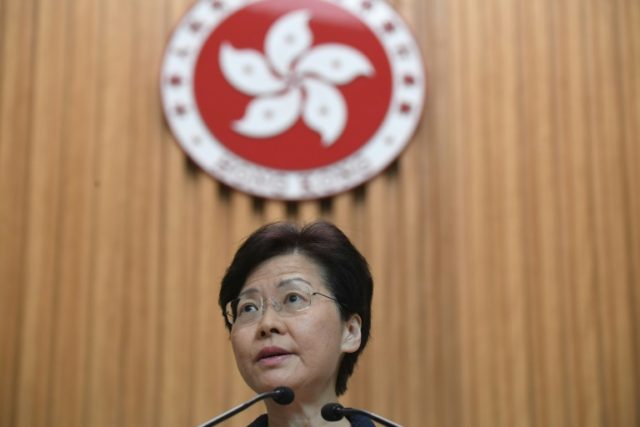The Chinese Communist Party is preparing a plan to remove Carrie Lam, the least popular chief executive in Hong Kong history, but will wait some time so as to not appear to be ceding to protests, the Financial Times reported on Wednesday.
The Times cited anonymous sources claiming that Lam may lose her job in March because the Communist Party will convene the National People’s Congress, a legislature completely subservient to dictator Xi Jinping, that month. It would also give police five months to subdue the pro-democracy movement that erupted in the city in June in response to a proposed law to allow China to extradite people present in Hong Kong.
The Chinese regime denied the report, calling it a false “rumor.”
Reporters caught Lam in a secret recording of a private meeting this summer lamenting that, if she had a choice, she would step down from the chief executive position, but her current powers were “limited.” Lam later denied she meant the Communist Party was forcing her to stay, instead claiming she meant the easy thing for her to do would be to step down but her conscience would not allow it.
The Financial Times report claimed Communist Party officials had put the proposal to remove Lam on Xi’s table, but it had not yet been approved. The deal would reportedly replace Lam with an “interim” chief executive for the rest of her term, which would end in 2022.
The newspaper listed several potential successors, all with close ties to Beijing:
Leading candidates to succeed Ms Lam include Norman Chan, former head of the Hong Kong Monetary Authority, and Henry Tang, son of a textile magnate who has also served as the territory’s financial secretary and chief secretary for administration, the people added.
[…]
Mr Chan is one of the “three Chans” viewed as possible successors to Ms Lam. But the other two — Paul Chan, financial secretary, and Bernard Chan, convener of an “executive council” that advises Ms Lam — are viewed as being too close to her now discredited administration.
Lam’s office did not comment on the story, and the Chinese Foreign Ministry denied it. According to the Global Times, a government propaganda newspaper, foreign ministry spokeswoman Hua Chunying “said that the central government will firmly support Lam and Hong Kong Special Administrative Region (HKSAR) government in governing according to the law, stopping the violence and chaos as soon as possible and restoring order.” Hua reportedly dismissed the Financial Times report as “political rumors with ulterior motives.”
The foreign ministry notably omitted any discussion of Carrie Lam from the transcript of its regular press briefing Wednesday, where the Global Times said Hua made those remarks.
The Hong Kong Public Opinion Research Institute found in a poll published this month that Lam is the least popular chief executive in the history of the city. Only 15 percent of those polled said they would vote for Lam if Hong Kong had the right to elect its leaders; currently, the Communist Party appoints the chief executive and a secretive special interest lobby chooses half the city’s lawmakers. Voters only choose half of their lawmakers by vote and the government screens candidates for unfavorable positions towards China.
Lam had an approval rating of 22.3 percent, the lowest on record since the United Kingdom gave Hong Kong to the Communist Party in 1997.
Journalists have repeatedly questioned Lam for staying in power amid the worst unrest the city has seen under China, triggered by her government promoting the extradition bill – which would allow China to imprison Hong Kong residents and visitors for violations of communist law. During a fiery press conference in August, Lam had to field questions such as “Do you have a conscience?” and “When will you die?”
The protests that began in June initially demanded only the withdrawal of the extradition bill. Today, the protesters have added four demands to that list: freedom for political prisoners locked up for opposing the bill, direct election of lawmakers, an end to the government referring to peaceful protests as “riots,” and an independent investigation into police brutality.
The protesters are not demanding Lam resign – specifically because they know China will replace her with another pro-communist leader – so many have questioned what removing Lam would do to please protesters.
“The plan definitely has come too late as Carrie Lam’s net support… dropped to a disastrous level as early as four months ago,” political analyst Dixon Sing told the Agence France-Presse (AFP). “It is impossible to believe that Hong Kong people… would be happy and go back home once Carrie Lam has stepped down.”
“I don’t think a change in chief executive will have much impact on the profound political crisis that Hong Kong is facing,” Ben Bland, director of the Southeast Asia Project at the Lowy Institute, told the Asian outlet Coconuts, which covers Hong Kong. “The problem is less who leads Hong Kong and more that its leaders have no popular legitimacy because they are effectively chosen by Beijing.”
The Hong Kong government formally withdrew the extradition bill on Wednesday, which Lam had promised protesters they would do.
Follow Frances Martel on Facebook and Twitter.

COMMENTS
Please let us know if you're having issues with commenting.